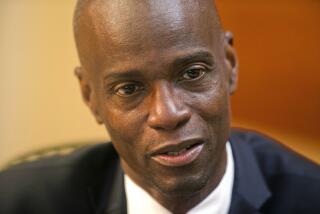Letelier Murder Case Sentences Upheld in Chile
SANTIAGO, Chile — The Supreme Court upheld the prison sentences of two top military officers Tuesday for ordering the 1976 assassination of Orlando Letelier, a prominent Chilean Socialist who was killed by a car bomb in Washington.
Retired army Gen. Manuel Contreras, chief of the ruthless secret police agency that persecuted opponents of Chile’s military regime in the mid-1970s, received a seven-year sentence. The court imposed a six-year term on Brig. Pedro Espinoza, who was Contreras’ chief of operations and is still on active duty in the army.
The long-awaited sentences are the most significant action yet taken against officials responsible for thousands of human rights crimes under the 16 1/2-year military regime that ended in 1990.
Chileans had spent a nervous week anticipating the verdict and the army’s reaction.
Although no one here expected a coup, there were signs of unrest in the army, which is said to fear a “domino effect” of further sentences against officers.
President Eduardo Frei, in a nationally broadcast message Tuesday night, said the verdict “cannot and must not” be used to judge the armed forces.
“I am confident that maturity and serenity will prevail,” Frei said.
Before the verdict, Contreras had said he would never spend a day in jail, and there was speculation that he would resist arrest, provoking an armed confrontation. On television Tuesday night, he protested the verdict, saying he had been convicted without proof and insisting he has a constitutional right to appeal.
“I am not going to any jail as long as there is no real justice,” he vowed, speaking from his ranch in southern Chile.
Tuesday’s decision by a five-member panel of the Supreme Court confirmed a sentence handed down in 1993 by one of the court’s justices.
Contreras and Espinoza were charged as “co-authors” of the murder of Letelier and his American associate, Ronni Moffitt, who was in Letelier’s car when the bomb exploded.
Under Chile’s justice system, Tuesday night’s decision is considered more important than the initial verdict.
“There can be no appeal,” said Carlos Meneses, the Supreme Court secretary, after reading the sentence over national television.
The verdict brings to a close a court case that dragged on for 17 years, sometimes sparking heated conflict between the U.S. and Chilean governments.
“The United States applauds the successful efforts of the Chilean government to investigate and prosecute those accused of killing Orlando Letelier and his American aide, Ronni Moffitt,” said a statement issued by the U.S. Embassy.
The Letelier assassination was the most notorious of more than 2,600 cases of death or disappearance blamed on security forces during the regime headed by Gen. Augusto Pinochet. Pinochet, 79, is still the army’s commander in chief.
Fabiola Letelier, Orlando Letelier’s sister, helped keep the court case alive over the years.
After Tuesday’s verdict, she told reporters that she felt “a deep feeling of joy, because I believe for the first time in Chile we have obtained a just sentence.”
Outside, hundreds of people who had waited for the verdict cheered and chanted. Later, disturbances broke out near the court and in other areas as leftist students skirmished with police.
At least one civilian and one policeman were injured.
Contreras, a portly 66-year-old with gray hair and chubby cheeks, has repeatedly denied any responsibility for Letelier’s death. He has blamed it on a plot by the Central Intelligence Agency to embarrass Chile’s former military government.
Former President Bush, who headed the CIA in 1976, has denied the agency was involved.
Contreras is also being prosecuted in Italy on charges of ordering the attempted assassination in 1975 of Bernardo Leighton, a prominent Christian Democratic exile.
Letelier belonged to the Marxist-oriented Socialist Party of President Salvador Allende, who was elected in 1970 on a coalition ticket of Communists, Socialists and other leftists. Letelier served Allende as ambassador to Washington, then as foreign minister and defense minister.
Pinochet led a bloody coup against Allende in 1973. Allende, refusing to surrender, committed suicide.
Military authorities imprisoned Letelier after the coup, and Pinochet later sent him into exile, where he was an outspoken critic of the military government.
While working for a leftist think tank in Washington, Letelier lobbied for the United States and other countries to stop Chilean aid and investment.
Pinochet’s junta revoked Letelier’s citizenship in June, 1976--three months before he was killed.
In the United States, FBI investigators traced the assassination to the Chilean secret police and to anti-Communist Cuban exiles. A key figure in the case was Michael Townley, an American collaborator of the Chilean police who had grown up in Chile.
Bowing to U.S. pressure in 1978, Chile extradited Townley. Under a plea bargain, he told prosecutors how he built the bomb and placed it under Letelier’s car, ready for Cuban exiles to detonate by remote control. Four Cubans were convicted in the case, although two of the convictions were overturned.
Townley spent 62 months in prison before being released in 1983 under the U.S. federal witness protection program.
On the basis of Townley’s confession, the United States charged Contreras and Espinoza with ordering the assassination. But the Chilean Supreme Court refused to extradite the two officers, ruling that evidence obtained in a plea bargain is not admissible under Chilean law.
A 1978 decree, which still stands, granted amnesty for political crimes committed under the military government. But in issuing the decree, the military government yielded to U.S. pressure and excluded the Letelier assassination from crimes subject to amnesty.
Also under U.S. pressure, a military court began investigating the case in 1978. The case was transferred to civilian court in 1991. In November, 1993, Supreme Court Justice Alfredo Banados reached a preliminary verdict in the case.
More to Read
Sign up for Essential California
The most important California stories and recommendations in your inbox every morning.
You may occasionally receive promotional content from the Los Angeles Times.










